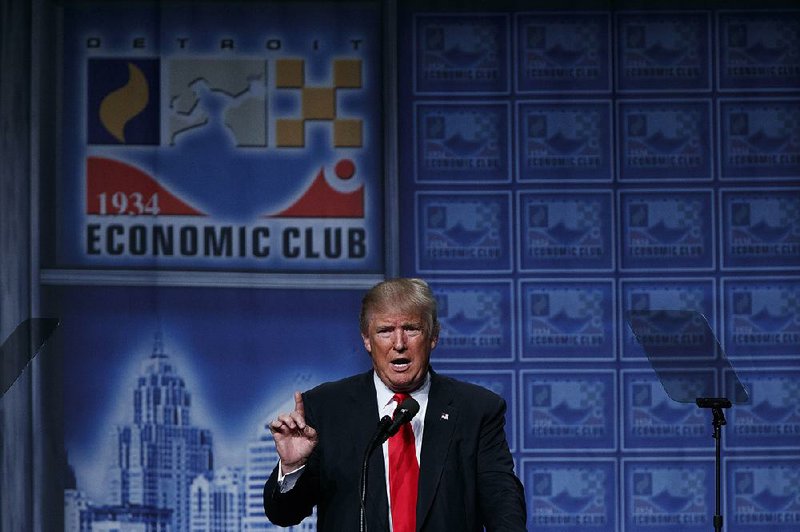DETROIT -- Promising to "jump-start America" to a new era of prosperity, Donald Trump announced a revamped economic plan Monday aimed at revitalizing a stagnant U.S. economy by cutting taxes for workers and businesses. He assailed Hillary Clinton as a candidate who would merely extend a Democratic period of old ideas and weakness.
FULL ELECTION COVERAGE
Clinton, meanwhile, began a two-day campaign swing through Florida.
Trying to move past recent stumbles, Trump proposed a simplified, three-bracket income tax that hewed closely to what House Republicans have recommended, the latest indication the GOP presidential nominee is working to put infighting with his party's leaders behind him. In a shift from the plan he proposed during the primary season, he increased the tax rate that the highest-earning Americans would pay.
With few exceptions, Trump provided more of a philosophical basis for an economic plan than a series of specifics.
He did spell out proposed tax brackets and called for greater child care deductions for families.
As he called for urgent change away from Democratic policies, he envisioned a nation refocused on manufacturing at home and wary of trade deals abroad -- a country bearing little resemblance to the globally focused economy of recent years.
"Americanism, not globalism, will be our new credo," he said in his address at the Detroit Economic Club. "Our country will reach amazing new heights -- maybe heights never attained before."
While explaining his economic plan, Trump focused in part on taxes on U.S. businesses, declaring that no company should pay more than 15 percent of its income in taxes. That would be a major drop from the current 35 percent corporate tax rate, though many companies pay much less because of various deductions. He also called for a moratorium on federal regulations, which he framed as strangling businesses.
As in the House GOP plan backed by Ryan, Trump's proposal on individual income taxes would simplify the code, which currently has seven brackets, down to three, and lower the top rate to 33 percent after deductions from the current 39.6 percent. That's a departure from the plan Trump unveiled last fall during the GOP primary that envisioned four brackets and a top rate of 25 percent.
"Now the whole party is unified with a tax message," said Trump economic policy adviser Stephen Moore.
In a new proposal, Trump called for allowing parents to fully deduct the average cost of child care from their taxable income. It's a theme Trump and his daughter, Ivanka, first introduced during the Republican National Convention, part of an effort to broaden the appeal to Democratic voters and sway women ahead of the general election.
The current Child and Dependent Care tax credit includes caps for qualifying expenses that Trump's plan would alter, though aides said there would be an income limit for eligibility. Trump said he had been working on the plan with Ivanka and planned to unveil it in the coming weeks, along with new proposals on school choice and funding for police.
The plan offers a fresh example of how the unconventional nominee is reshaping the Republican Party.
Delivering his speech from a teleprompter, Trump was interrupted repeatedly by protesters who stood on chairs and shouted at him before being pulled out of the room by security guards. He did not react harshly as he often has in the past, either quietly thanking the guards or simply powering ahead in his speech.
Only days ago, Trump triggered panic within the GOP when he declined to endorse House Speaker Paul Ryan's re-election or those of other leading Republicans. He sought to put the dust-up to bed Friday by finally backing those candidates while also trying to move past other contentious subjects such as his verbal attacks on a Muslim-American family whose son died fighting in Iraq.
Republicans inside and outside of Trump's campaign have implored him to shift the conversation back to Democrat Clinton's perceived shortcomings. On Monday, he obliged, accusing her of jilting American workers and coming up short on promises to constituents.
"The one common feature of every Hillary Clinton idea is that it punishes you for working and doing business in the United States," Trump said. He said he wants to "jump-start America" and added, "It won't even be that hard."
Clinton's critique
At her own rally in St. Petersburg, Fla., Clinton assailed Trump's plans, arguing they would benefit the rich and do little to create jobs or boost the economy.
"His tax plans would give super-big tax breaks to large corporations and the really wealthy," Clinton said, suggesting they would push the country into another recession.
At a rally later in the day in Kissimmee, Fla., Clinton continued her criticism, saying that Trump "hasn't offered any plans on infrastructure besides building a wall and having Mexico pay for it." She also stressed her commitment to small businesses, asking, "Would you rather have a president who says you're fired or you're hired?"
She has scheduled her own speech in Detroit later in the week. Her campaign says she will call for the largest investment in jobs since World War II.
Later Monday, Trump suggested on Twitter that Clinton's emails may be responsible for the death of an Iranian nuclear scientist who was executed for spying for the United States.
"Many people are saying that the Iranians killed the scientist who helped the U.S. because of Hillary Clinton's hacked emails," he tweeted.
He didn't say which people he meant. The FBI has said there is no evidence that Clinton's emails were hacked because of her use of a private account and server during her tenure as secretary of state.
Clinton's campaign spokesman Nick Merrill fired back on Twitter. "'Many people are saying'='I made this up.'"
Merrill added that after Trump's morning speech to the Detroit Economic Club and sticking closely to his script, "the muzzle was bound to come off."
Trump isn't the first to suggest there could be a link between Clinton's emails on her private server and the execution of Shahram Amiri.
Sen. Tom Cotton, R-Ark., said Sunday on CBS' Face the Nation that there "were on Hillary Clinton's private server, there were conversations among her senior advisers about this gentleman."
Amiri, an Iranian scientist, defected to the U.S. at the height of Western efforts to thwart Iran's nuclear program, U.S. officials have said. When he returned to Iran in 2010, he was given a hero's welcome and greeted with flowers by government leaders. Then he disappeared.
Amiri's case indirectly found its way into the spotlight last year with the release of State Department emails sent and received by Clinton.
A couple of emails forwarded to Clinton by senior adviser Jake Sullivan in 2010 appear to refer to the scientist.
GOP defectors
Fifty of the nation's most senior Republicans from the national-security field, many of them former top aides or Cabinet members for President George W. Bush, have signed a letter declaring Trump "lacks the character, values and experience" to be president and "would put at risk our country's national security and well-being."
Trump, the officials warn, "would be the most reckless president in American history."
The letter says Trump would weaken the United States' moral authority and questions his knowledge of and belief in the Constitution. It says he has "demonstrated repeatedly that he has little understanding" of the nation's "vital national interests, its complex diplomatic challenges, its indispensable alliances and the democratic values" on which U.S. policy should be based. And it laments that "Mr. Trump has shown no interest in educating himself."
"None of us will vote for Donald Trump," the letter states, though it notes later that many Americans "have doubts about Hillary Clinton, as do many of us."
Among the most prominent signatories are Michael Hayden, a former director of both the CIA and the National Security Agency; John Negroponte, who served as the first director of national intelligence and then deputy secretary of state; and Robert Zoellick, another former deputy secretary of state, U.S. trade representative and, until 2012, president of the World Bank.
The letter underscores the continuing rupture in the Republican Party, but particularly within its national security establishment. Many of those signing it had declined to add their names to a similar open letter released in March. But several of them said in recent interviews that they changed their minds once they heard Trump invite Russia to hack into Clinton's email server -- a sarcastic remark, Trump said later -- and say that he would check to see how much NATO members contributed to the alliance before sending forces to help stave off a Russian attack.
A spokesman for Trump did not immediately respond to a request for comment.
The Clinton campaign appeared to be aware that the letter was circulating and encouraged it but played no role in drafting it, several signatories said. Yet the letter echoes Clinton's main argument about her rival: that his temperament makes him unsuitable for the job, and that he should not be entrusted with the control of nuclear weapons.
"He is unable or unwilling to separate truth from falsehood," the letter says. "He does not encourage conflicting views. He lacks self-control and acts impetuously. He cannot tolerate personal criticism. He has alarmed our closest allies with his erratic behavior. All of these are dangerous qualities in an individual who aspires to be president and commander in chief, with command of the U.S. nuclear arsenal."
In recent weeks, some Republicans have defected to support the Clinton campaign or simply announced their refusal to vote for Trump in the general election.
One of those Republicans is Lezlee Westine, a former aide to George W. Bush, who on Monday announced her support for Clinton for president.
"Our nation faces a unique set of challenges that require steady and experienced leadership," Westine said in a statement. "That is why today I am personally supporting Hillary Clinton."
Sen. Susan Collins, R-Maine, announced Monday that she would not vote for Trump.
"This is not a decision I make lightly, for I am a lifelong Republican," Collins wrote in an op-ed column in The Washington Post. "But Donald Trump does not reflect historical Republican values nor the inclusive approach to governing that is critical to healing the divisions in our country."
Collins also said she does not support Clinton.
Wadi Gaitan, the chief spokesman for the Florida Republican Party, who is Hispanic, has announced he will leave his job and join the Libre Initiative, a conservative organization backed by the industrialists Charles and David Koch, because of differences with Trump.
Gaitan, a former senior House Republican aide who focused on Hispanic affairs, is yet another high-profile Hispanic Republican official to leave his job because he can no longer tolerate defending and explaining Trump, who has maligned immigrants, minorities and women, a strategy that helped him win the party's nomination but that has led to poor approval ratings among black and Hispanic voters.
Former Florida Gov. Jeb Bush's son, Texas Land Commissioner George P. Bush, recently urged Republicans to do the opposite of those who signed the letter and other Republican defectors and support the man who beat his father in a fiercely fought GOP primary, deriding him as "low energy."
Addressing a private gathering of Texas Republican Party leaders on Saturday, Bush called for helping Trump win in November.
"From Team Bush, it's a bitter pill to swallow. But you know what? You get back up and you help the man that won, and you make sure that we stop Hillary Clinton," Bush said in a video first posted online by the Texas Tribune.
He declined further comment Monday.
Information for this article was contributed by Jill Colvin, Josh Lederman, Catherine Lucey, Nicholas Riccardi and Will Weissert of The Associated Press; by David E. Sanger and Matt Flegenheimer of The New York Times; and by Abby Phillip and Ed O'Keefe of The Washington Post.
A Section on 08/09/2016

